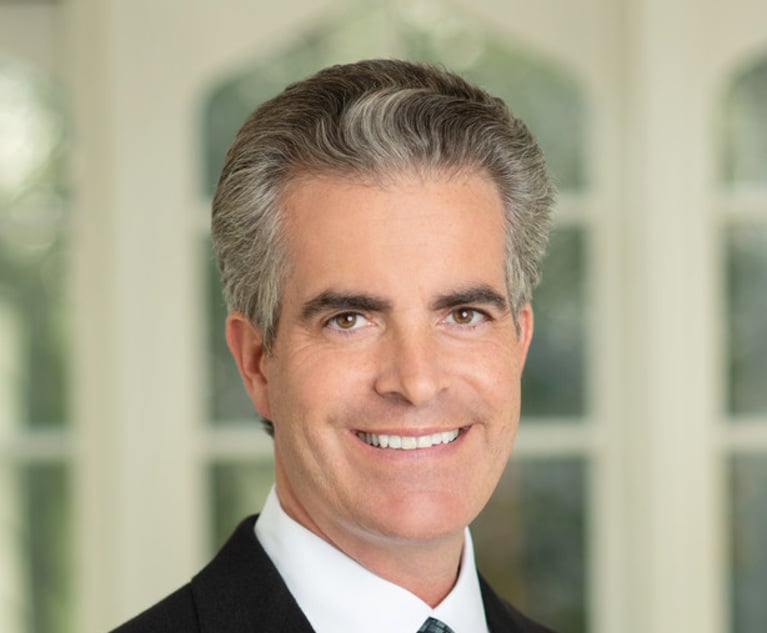 L-R: Abbye E. Alexander, Christopher J. Tellner and Gregory F. Brown of Kaufman, Dolowich & Voluck. Courtesy photos
L-R: Abbye E. Alexander, Christopher J. Tellner and Gregory F. Brown of Kaufman, Dolowich & Voluck. Courtesy photos Medical Professional Liability Lawsuit Venue—New Post-COVID Considerations
In 2018, the Supreme Court of Pennsylvania Civil Procedural Rules Committee (rules committee) proposed elimination of Rule 1006(a.1) (venue rule), which requires that a medical professional liability action be brought in "a county in which the cause of action arose."
March 28, 2022 at 01:20 PM
8 minute read
In 2018, the Supreme Court of Pennsylvania Civil Procedural Rules Committee (rules committee) proposed elimination of Rule 1006(a.1) (venue rule), which requires that a medical professional liability action be brought in "a county in which the cause of action arose." Since the change was first proposed, the COVID-19 pandemic accelerated the trends that led to implementing the Venue Rule nearly 20 years ago. As the health care economy adjusts to a post-COVID-19 environment, the case for the venue rule proposed revision is even less compelling than it was when it was first suggested.
When the rules committee proposed to eliminate the venue rule in December 2018, it characterized the venue rule as "special treatment to a particular class of defendants" that "no longer appears warranted." The rules committee explained that when the venue rule was first implemented, there was a significant decrease in medical malpractice filings and a reduction in payouts. The rules committee proposed that eliminating the venue rule would "restore fairness" to venue procedure. To reach its objective, the rules committee proposed removing subsection (a.1) entirely and any reference to medical professional liability. Under the proposed revision, venue in a medical professional liability lawsuit would be proper where: "the individual may be served; the cause of action arose; a transaction or occurrence took place out of which the cause of action arose; [or] venue is authorized by law." In effect, medical professional liability defendants would be subject to the same venue rules as any other civil defendant.
This content has been archived. It is available through our partners, LexisNexis® and Bloomberg Law.
To view this content, please continue to their sites.
Not a Lexis Subscriber?
Subscribe Now
Not a Bloomberg Law Subscriber?
Subscribe Now
NOT FOR REPRINT
© 2025 ALM Global, LLC, All Rights Reserved. Request academic re-use from www.copyright.com. All other uses, submit a request to [email protected]. For more information visit Asset & Logo Licensing.
You Might Like
View All
Superior Court Rejects Pa. Hospital's Challenge to $7.3M Med Mal Judgment
3 minute read
Pa. Appeals Court: Trial Judge Dismissed Med Mal Claims Without Giving Plaintiffs Proper Time to Fight Back
4 minute read
Pa. Hospital Agrees to $16M Settlement Following High Schooler's Improper Discharge
4 minute readTrending Stories
- 1South Carolina Physicians Challenge Abortion Ban Under Religious Freedom Claims
- 2Special Series Part 5: The State’s Bond Lock Impermissibly Delegates Legislative Authority
- 3President-Elect Donald Trump Sentenced to Unconditional Discharge
- 4JCPenney Customer's Slip-and-Fall From Bodily Substance Suit Best Left for a Jury to Decide, Judge Rules
- 5Products Liability: The Absence of Other Similar Claims—a Defense or a Misleading Effort to Sway a Jury?
Who Got The Work
Michael G. Bongiorno, Andrew Scott Dulberg and Elizabeth E. Driscoll from Wilmer Cutler Pickering Hale and Dorr have stepped in to represent Symbotic Inc., an A.I.-enabled technology platform that focuses on increasing supply chain efficiency, and other defendants in a pending shareholder derivative lawsuit. The case, filed Oct. 2 in Massachusetts District Court by the Brown Law Firm on behalf of Stephen Austen, accuses certain officers and directors of misleading investors in regard to Symbotic's potential for margin growth by failing to disclose that the company was not equipped to timely deploy its systems or manage expenses through project delays. The case, assigned to U.S. District Judge Nathaniel M. Gorton, is 1:24-cv-12522, Austen v. Cohen et al.
Who Got The Work
Edmund Polubinski and Marie Killmond of Davis Polk & Wardwell have entered appearances for data platform software development company MongoDB and other defendants in a pending shareholder derivative lawsuit. The action, filed Oct. 7 in New York Southern District Court by the Brown Law Firm, accuses the company's directors and/or officers of falsely expressing confidence in the company’s restructuring of its sales incentive plan and downplaying the severity of decreases in its upfront commitments. The case is 1:24-cv-07594, Roy v. Ittycheria et al.
Who Got The Work
Amy O. Bruchs and Kurt F. Ellison of Michael Best & Friedrich have entered appearances for Epic Systems Corp. in a pending employment discrimination lawsuit. The suit was filed Sept. 7 in Wisconsin Western District Court by Levine Eisberner LLC and Siri & Glimstad on behalf of a project manager who claims that he was wrongfully terminated after applying for a religious exemption to the defendant's COVID-19 vaccine mandate. The case, assigned to U.S. Magistrate Judge Anita Marie Boor, is 3:24-cv-00630, Secker, Nathan v. Epic Systems Corporation.
Who Got The Work
David X. Sullivan, Thomas J. Finn and Gregory A. Hall from McCarter & English have entered appearances for Sunrun Installation Services in a pending civil rights lawsuit. The complaint was filed Sept. 4 in Connecticut District Court by attorney Robert M. Berke on behalf of former employee George Edward Steins, who was arrested and charged with employing an unregistered home improvement salesperson. The complaint alleges that had Sunrun informed the Connecticut Department of Consumer Protection that the plaintiff's employment had ended in 2017 and that he no longer held Sunrun's home improvement contractor license, he would not have been hit with charges, which were dismissed in May 2024. The case, assigned to U.S. District Judge Jeffrey A. Meyer, is 3:24-cv-01423, Steins v. Sunrun, Inc. et al.
Who Got The Work
Greenberg Traurig shareholder Joshua L. Raskin has entered an appearance for boohoo.com UK Ltd. in a pending patent infringement lawsuit. The suit, filed Sept. 3 in Texas Eastern District Court by Rozier Hardt McDonough on behalf of Alto Dynamics, asserts five patents related to an online shopping platform. The case, assigned to U.S. District Judge Rodney Gilstrap, is 2:24-cv-00719, Alto Dynamics, LLC v. boohoo.com UK Limited.
Featured Firms
Law Offices of Gary Martin Hays & Associates, P.C.
(470) 294-1674
Law Offices of Mark E. Salomone
(857) 444-6468
Smith & Hassler
(713) 739-1250






